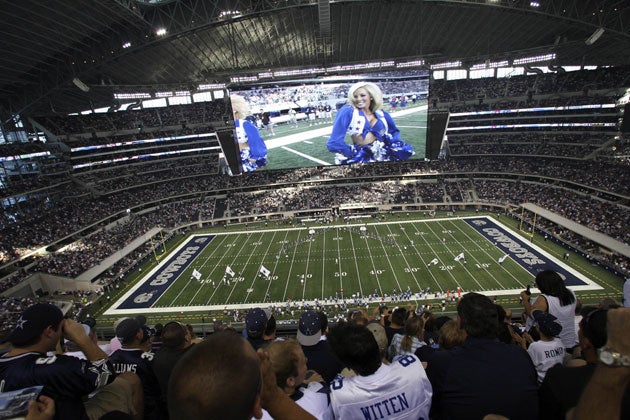American Football: Size isn't everything in Cowboys country
Dallas run into trouble as punters keep kicking balls into monstrous TV screens and fans moan that they can't see the game

In downtown Dallas they sell T-shirts in silver and blue declaring that "everything is bigger in Texas". Yet for all the star-spangled overconfidence of its XL-sized fans, American Football's brashest institution has just discovered that bigger is not always better.
A week shy of the ticker-tape pageantry that marks the start of a new NFL season, the Dallas Cowboys have been dominating the United States' sports pages, thanks to a bizarre controversy regarding the design of their new home: a 120,000-seat edifice on the outskirts of Arlington.
The dispute has ignited passions over the ever-increasing commercialisation of the national winter sport, and overshadowed the club's efforts to break a soul-destroying run of underachievement that has seen them go 13 years without a Super Bowl win.
It revolves around TV screens. Four of them, in a 60-yard-long, 30-yard- high installation that dominates the $1.15 billion (£700m) Cowboys Stadium, are suspended – in a display of high-definition Texan grandiosity – 90 feet above the playing field.
Unfortunately, 90 feet is too low. At least it is by the standards of today's punters, who have been banging balls into the $40m screens with unerring regularity during a recent run of pre-season friendlies, which have seen the club win two in four.
Each time the ball whacks a monitor, match officials are required to call a halt to proceedings and consult their instant replay to confirm that contact has taken place. Presuming it has, the kick must be replayed.
To fans, this represents yet another intrusion into the smooth running of a sport that is already hobbled by endless "timeouts" and advertising breaks. Though playing time is 60 minutes, a typical stop-start NFL game takes between three and four hours.
Critics are also irked because the enormous video screens symbolise creeping corporatisation. They exist, or so the argument goes, because club-owners – across all professional sports – are building vast and lucrative new stadiums that cram free-spending punters into faraway seats.
In many grounds, not least the three-million-square-foot Cowboys Stadium, which has some of the highest ticket prices of any sports venue ever built – luxury suites cost $150,000 per game – fans in affordable sections are barely able to see what's happening on the field with the naked eye.
"They still buy the tickets because there's still something about being able to say you were there. But these big screens they've had to build have been intruding on the way the game is played," says Bob Cohn, a sportswriter for The Washington Times.
"You can mock luxury suites, and you can mock spectators who fork out hundreds of dollars to watch a live event only to spend hours gawping at the big screen. But those are all moral issues. When the screen starts interfering with the game itself, then it crosses a line."
The debate has raised some traditional regional prejudices. "If I were to stereotype, which is part of my job, I'd say this is typical Cowboys mentality," adds Cohn. "Everything is bigger in Texas, especially in Dallas, the big D. This stadium, and those screens, reflect their ego and grandiosity. You could say it suits their market."
The controversy comes at an unwelcome time for the NFL, which is worried that attendances this season will suffer amid the economic downturn. Some clubs are struggling to sell out games as average ticket prices rise by eight per cent, to $72.
At a hastily called press conference this week, NFL commissioner Roger Goodell said the Cowboys would not have to raise the screens this year, noting that they do not contravene any league guidelines. However, he promised to reconsider the matter before the start of the 2010 season, when Dallas will host the Super Bowl.
The Cowboys owner, Jerry Jones, hardly dampened the controversy, though. When A J Trapasso of the Tennessee Titans put a punt into one of the screens in a pre-season friendly, Jones flippantly declared: "There's no reason why this can't be something [for punters] to deal with, similar to the way you'd deal with the wind in your face or with rain, sleet or snow."
Teams to watch this season
NFC The Dallas Cowboys are among the most-fancied teams. Quarterback Tony Romo has now dispensed with his celebrity girlfriend Jessica Simpson, who was blamed by fans for a period of iffy form. Their greatest threat is geography: Dallas share the Eastern Division with the NFC's two other strongest teams, the New York Giants and the Philadelphia Eagles, whose decision to gamble on former jailbird Michael Vick as their spare quarterback could well lend versatility to their offence.
AFC Clear favourites are the New England Patriots, who have tasted victory in three of the last eight Super Bowls, closely followed by the Pittsburgh Steelers who won in 2006 and '08, and still have the backbone of their championship side. San Diego are lively outsiders but tend to underperform in the play-offs. The Indianapolis Colts, with fully-fit quarterback Peyton Manning to start this year's campaign, should reach the business end of the season too.
Guy Adams
Join our commenting forum
Join thought-provoking conversations, follow other Independent readers and see their replies
Comments
Bookmark popover
Removed from bookmarks